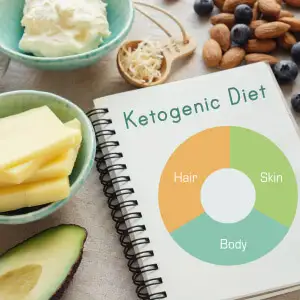The ketogenic diet, or keto diet, has gained immense popularity in recent years for its ability to promote weight loss and improve overall health. But did you know that following a keto diet can also have a positive impact on your skin health? In this article, we will explore how a keto diet can improve your skin health and provide you with some frequently asked questions about this topic.
What is a keto diet?
Before we delve into the benefits of a keto diet for skin health, let’s first understand what a keto diet is all about. A ketogenic diet is a high-fat, low-carbohydrate diet that forces the body to burn fats rather than carbohydrates for energy. This metabolic state is known as ketosis, where the body produces ketones from fat stores to fuel the body and brain.
In a typical keto diet, the macronutrient breakdown is around 70-75% fats, 20-25% protein, and 5-10% carbohydrates. By drastically reducing carbohydrate intake, the body enters a state of ketosis, which has been shown to have various health benefits, including weight loss, improved blood sugar control, and increased energy levels.
How Can a keto diet Improve Your Skin Health?
1. Reduced Inflammation: One of the key benefits of a keto diet for skin health is its ability to reduce inflammation in the body. Chronic inflammation is a common underlying factor in various skin conditions, such as acne, eczema, and psoriasis. By cutting out inflammatory foods like sugar and processed carbs and focusing on whole, nutrient-dense foods, a keto diet can help reduce inflammation and improve skin health.
2. Balanced Blood Sugar Levels: High blood sugar levels can contribute to skin issues like acne and premature aging. By limiting carbohydrates and focusing on healthy fats and proteins, a keto diet can help stabilize blood sugar levels and prevent spikes that can lead to skin problems.
3. Increased Antioxidant Intake: A keto diet encourages the consumption of antioxidant-rich foods like leafy greens, berries, and nuts, which can help protect the skin from oxidative stress and damage caused by free radicals. Antioxidants are essential for maintaining healthy, youthful skin and can help reduce signs of aging.
4. Improved Gut Health: The gut-skin connection is a well-established concept in dermatology, with research suggesting that gut health plays a significant role in skin health. A keto diet can promote a healthy gut microbiome by reducing inflammation, supporting immune function, and promoting the growth of beneficial bacteria. A healthy gut can lead to clearer, healthier skin.
5. Hormone Balance: Hormonal imbalances can contribute to skin issues like acne and rosacea. By stabilizing blood sugar levels and reducing inflammation, a keto diet can help regulate hormones like insulin and cortisol, which can have a positive impact on skin health.
FAQs about keto diet and Skin Health:
Q: Can a keto diet cause skin issues?
A: While some people may experience temporary skin changes when starting a keto diet, such as acne flare-ups or dryness, these are usually due to the body adjusting to a new way of eating. As the body adapts to burning fats for fuel, these issues typically resolve on their own. If skin problems persist, it’s essential to consult a healthcare professional for personalized advice.
Q: Can a keto diet help with acne?
A: Some people report improvements in their acne symptoms when following a keto diet, thanks to its ability to reduce inflammation, balance hormones, and stabilize blood sugar levels. However, individual results may vary, and it’s essential to address the root cause of acne, which can be multifactorial.
Q: What are the best foods to eat for healthy skin on a keto diet?
A: To promote healthy skin on a keto diet, focus on nutrient-dense foods like fatty fish, avocados, nuts, seeds, leafy greens, and berries. These foods are rich in essential nutrients like omega-3 fatty acids, antioxidants, and vitamins that support skin health.
Q: Can a keto diet help with eczema or psoriasis?
A: While research on the effects of a keto diet on eczema and psoriasis is limited, some individuals have reported improvements in their symptoms when following a keto diet. By reducing inflammation, stabilizing blood sugar levels, and supporting gut health, a keto diet may help alleviate these skin conditions.
Q: Are there any potential side effects of a keto diet on skin health?
A: Some people may experience skin changes like dryness, acne flare-ups, or rashes when starting a keto diet, known as the “keto rash.” These issues are typically temporary and can be managed by staying hydrated, consuming enough healthy fats, and ensuring adequate nutrient intake.
In conclusion, a keto diet can have a positive impact on skin health by reducing inflammation, balancing hormones, stabilizing blood sugar levels, and supporting gut health. By focusing on nutrient-dense foods and avoiding inflammatory triggers, you can promote clear, healthy skin from the inside out. If you’re considering starting a keto diet for skin health, consult with a healthcare professional or a registered dietitian to ensure that it’s the right choice for you.
